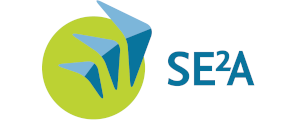
September
The class of 2023 started with the first content event!
They visited the Institute of Aircraft Design and Lightweight Construction. After a tour of the hall, they were allowed to test crushing. This involved dropping a weight onto a sample. This method is used in aircraft construction to test elements for various loads.
Many thanks to Mats Overbeck and Jorge Bustamante for the insights and the exciting experiment!
#se2a #se2a_changing#tubraunschweig #science #research
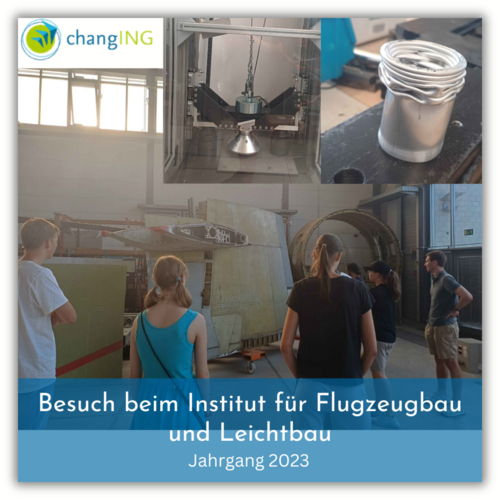
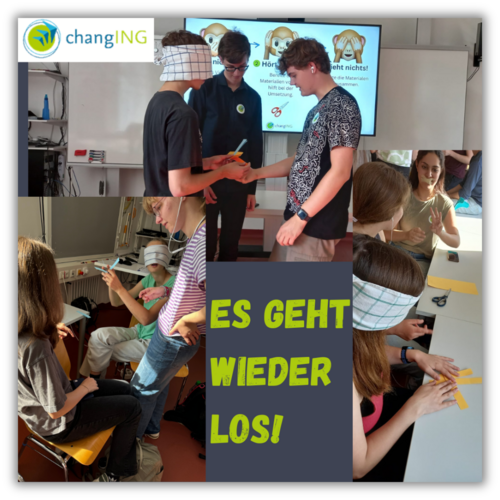
changING enters the next round!
At our kick-off event for the 2021, 2022 and 2023 cohorts, our participants were really challenged!
After a group-wide exchange about the past time and the experiences made, a challenge followed. They had to fold something in threes. However, one person was not allowed to see anything, one person was not allowed to say anything and one person was not allowed to hear anything. This turned a simple craft activity into a real challenge!
We look forward to the upcoming events and new projects!
#se2a #se2a_changing #tubraunschweig #science #research
August
Throw back to the 2023 smartphone challenge!
There is a lot of technology in our smartphones that can also be used for experiments. For example, the microphone can not only be used to make phone calls, but also to measure the ambient volume.
The students spent an afternoon together with exciting tasks related to smartphones.
#tb #se2a #se2a_changing #tubraunschweig #science #research
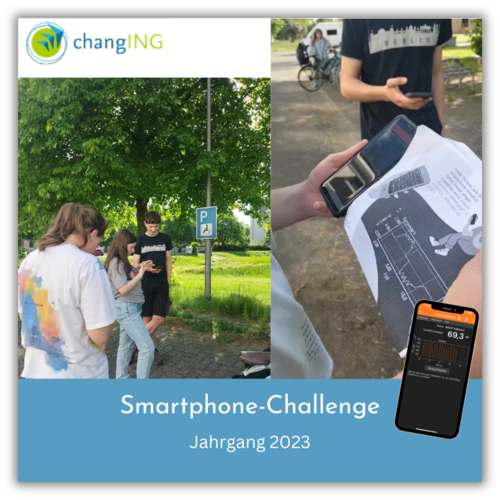

Throw back to the 2022 and 2023 workshop!
Dr. Angelique Eydam designed a self-discovery workshop with the students. Among other things, they found values that are most important to them and dealt more with professional and private goals.
Thank you Angelique for the successful workshop!
#tb #se2a #se2a_changing #tubraunschweig #research #science
Throw back to the visit to the Institute of Flight Guidance of the class of 2022!
After a short briefing, our students were allowed to fly the flight simulator in pairs and also take off and land themselves.
Many thanks to Andrés Arango and Jonas Füllgraff for their support!
#se2a #se2a_changing #science #research #tubraunschweig #tb
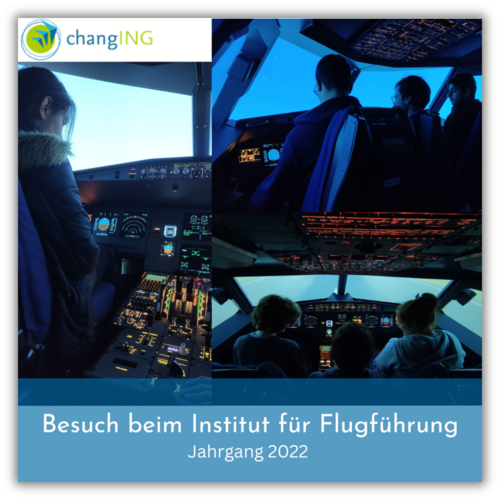
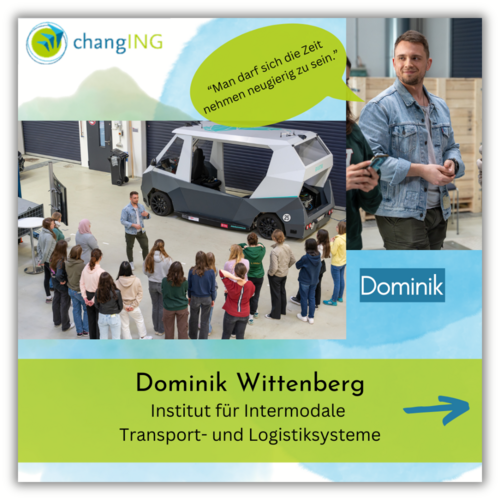
We would like to introduce you to our research assistants!
We continue with Dominik Wittenberg. He completed his bachelor's degree in mechanical engineering and chose to specialize in aerospace engineering for his master's degree. He now works as a research assistant at the Institute of Intermodal Transport and Logistics Systems. We also asked him a few questions, which he answered.
The most fascinating thing about my work is the constant confrontation with new challenges that are initially unclear as to how they can be solved. It's a lot of fun to find solutions to problems that I don't know how to tackle at first. The best ideas often come from sharing ideas with others. Everyone is free to express their thoughts, which leads to creative and innovative solutions - even if an approach doesn't seem very promising at first. This aspect and the freedom that an academic career offers was a major influence in my decision to become a research assistant at a technical university.
That was the decision to go to university, because that was never really an option for me. At the time, I switched from grammar school to secondary school because of poor grades and then completed an apprenticeship, after which I had a relaxed and good job. I was therefore in my comfort zone. Nevertheless, somehow I couldn't imagine doing the job for the rest of my life. It was too repetitive for me personally and had no challenges. Then, during a late shift, I spontaneously decided to go to university. That was the best decision I could have made.
At the beginning of my Bachelor's degree, my math skills were such that I could barely rearrange an equation. I found it correspondingly difficult to get into the first lectures, where I understood very little at first and wasn't sure how to get through. I overcame this by pushing through and trying to prove it to myself. This gave me the discipline to catch up on the knowledge I lacked and not let myself be dependent on others.
Believing in yourself is always important, whether it's in STEM or any other situation in life. You get self-confidence by knowing what you are capable of and, in situations where you are not sure, simply trying things out and pushing yourself to your limits. And it's perfectly okay to fail sometimes.
You have to be motivated to constantly tackle new challenges and not be discouraged by failures, but learn from them. Sometimes this also requires perseverance, but it always pays off in the end.
There are a wide variety of specializations and areas of application in the STEM professions. Personally, I would advise everyone to start with a general and open mind and take the time to find out in which direction they would like to specialize later on. You don't have to have your path mapped out straight after school. You can take the time to be curious.
The regio girls spent the last evening at the airport again, this time on the other side of the road at the Automotive Research Centre Niedersachsen (NFF).
Dominik Wittenberg guided the girls through the halls and explained the research projects of the Institute for Intermodal Transport and Logistics Systems. Afterwards, the Lions Racing Team also introduced themselves briefly.
The evening ended with the Cutebot Challenge, which was prepared by mentor Tessa Horenburger. They had to program the Cutebots the evening before so that they could control it remotely with another micro:bit. The test area was used for the race.
Many thanks to Dominik and the team for the insights!
#tb #se2a #se2a_changing #research #science #tubraunschweig
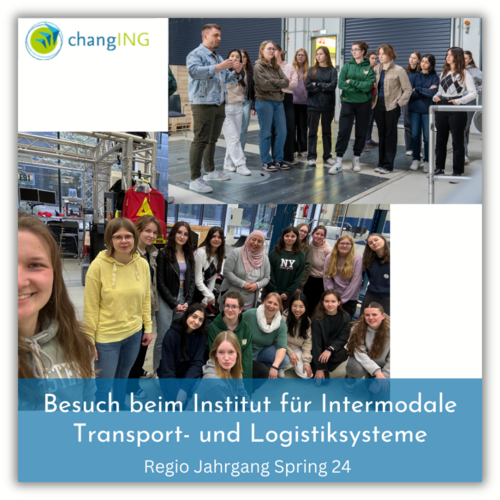

On Saturday morning, the girls from changING regio visited the physics didactics department. Dr. Angelique Eydam held a workshop with them on self-discovery. Among other things, the students identified the values that are most important to them and looked more closely at personal career goals.
Many thanks to Angelique for the successful workshop and the many impulses.
#science #research #tubraunschweig #se2a#se2a_changing #tb
The regio girls spent an afternoon at the airport and rotated through the institutes in groups. The Institute of Flight Guidance was also there.
Andrés Arango let the schoolgirls fly an airplane in the flight simulator. He was supported by Jonas Füllgraff. Each student was also allowed to land as a pilot. No aircraft was damaged and all passengers survived!
Many thanks to Andrés and Jonas for helping us fly!
#tb #se2a #se2a_changing #research #science #tubraunschweig
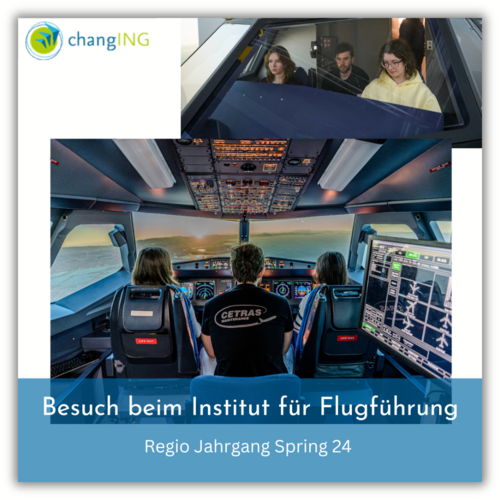
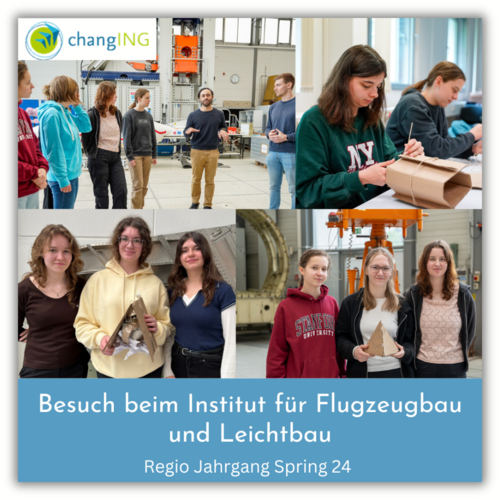
The regio girls spent an afternoon at the airport and rotated through the institutes in groups. The Institute of Aircraft Design and Lightweight Structures was also there.
Mats Overbeck and Jorge Bustamante guided the students through the hall and led the egg challenge. They had to wrap an egg with the given materials so that it could survive a fall from 10 meters. Spoiler: All the eggs survived!
Thank you, Mats and Jorge, for the guidance and the challenge!
#tb #se2a #se2a_changing #research #science #tubraunschweig
The girls from changING regio visited the Battery LabFactory right at the start. Aleksandra Naumann and Edith Uhlig first took us through the process of manufacturing batteries.
Later, they also showed us the site at the airport and how the batteries are recycled. During the joint raft trip on Wednesday evening, the students also had the opportunity to talk to the two of them.
Many thanks, Aleksandra and Edith, for the insights!
We would also like to introduce you to Aleksandra!
Aleksandra studied Chemical Engineering and now works as a research assistant at the Institute of Machine Tools and Production Technology.
My top priority has always been to do something that benefits the environment. As an engineer, I think you have a lot of leverage to achieve a lot with small changes in production, for example when it comes to resource efficiency.
I was particularly proud when I saw a presentation at a conference that incorporated the results of my bachelor's thesis a few years ago. It made me realize that I could really contribute to research even as a student.
During my Master's thesis in the USA, the Covid pandemic broke out and almost all labs were abruptly closed. I thought that I wouldn't be able to complete my experiments and therefore my thesis. But with a lot of effort and research, my supervisor and I were able to find ways to carry out other experiments with other equipment. That's when I learned that you can always find a solution somehow.
Believing in yourself is of course super important, especially during your studies, but everyone who has studied knows the doubts in between. My tip is to try out a lot and be open to new things, even if you think you already know what you want. I know very few people who have had a completely “straightforward” career path.
Being able to organize and help yourself is very important, especially in everyday life as a doctoral student. Especially in research, you learn very independently.
My recommendation is to attend as many information events as possible and get an understanding of what you can actually do in everyday working life. There are so many professions and areas of work that you have never thought about. The degree course itself often “only” offers a broad basis with which you can become a lot.
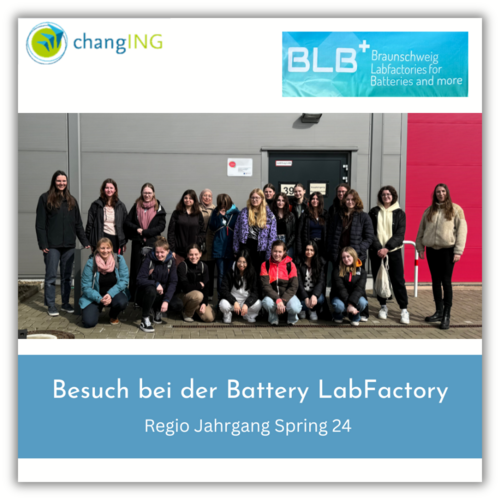
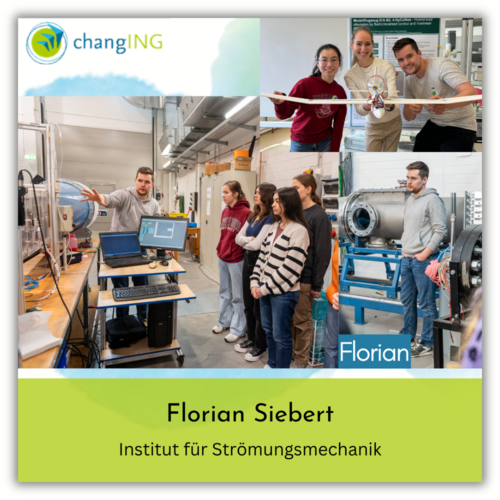
June
We would like to introduce you to our research assistants!
We continue with Florian Siebert. He also completed his Bachelor's degree in Mechanical Engineering. He chose to specialize in aerospace engineering in his Master's degree. He now works as a research assistant at the Institute of Fluid Mechanics. We also asked him a few questions, which he answered.
When I started gliding in my youth, I was fascinated by the elegance with which gliders glide through the air. Following this enthusiasm, I ended up studying aerospace engineering with a focus on aerodynamics.
I was a bit proud when I saw for the first time that scientific publications that I had contributed to as a student were being read and cited by other scientists. That's when I realized that for the first time I was actually contributing to the scientific community with what I can and do.
Great and seemingly unsolvable challenges are often encountered as a scientist, especially at the beginning when you are an inexperienced student facing your first scientific project and things are not working as they should. In such moments, tenacity, patience and self-confidence are required in order not to simply throw everything away in despair.
See previous answer: If you're in a tricky situation, it helps if you approach things calmly, trusting that you'll solve it somehow. Afterwards, the problem no longer seems as big as it seemed beforehand and these experiences are the best way to build up more and more self-confidence over time.
The easy answer: It's all about enjoying what you do. The uncomfortable answer: math and programming. Those are really important skills.
Choose the training/course of study/specialization that you find the most exciting and not the one that you hope will give you the best career prospects. Many people change specializations in the course of their careers anyway, so it's not worth studying something you only have a mediocre interest in.
The regio girls spent an afternoon at the airport and rotated through the institutes in groups. They also visited the Institute of Fluid Mechanics.
Florian Siebert guided the girls through the halls and explained how the wind tunnel works. They were then able to experiment for themselves: Clamp the aerofoil model, align it, start the measurement and note down the values.
The laminar and turbulent flows were also made visible using color and fog. You could even hear them with a stethoscope!
Thank you, Florian, for the cool experiments!
#tb #se2a #se2a_changing #research #science #tubraunschweig
![[Translate to English:] ISM](/fileadmin/_processed_/0/e/csm_ISM_regio_spring_24_BS-2_9a0becbf81.png)
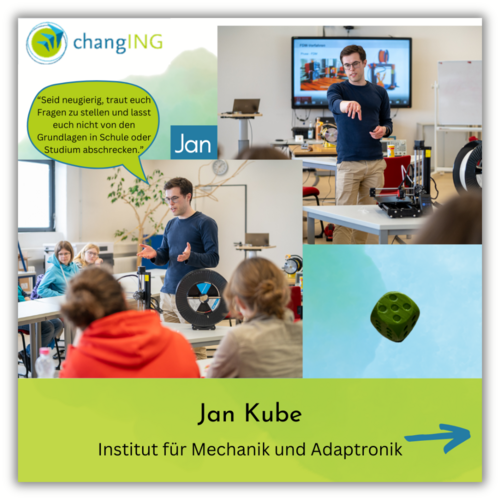
We would like to introduce you to our research assistants!
We continue with Jan Kube. He studied mechanical engineering in his Bachelor's degree. In his Master's degree, he majored in aerospace engineering and now works as a research assistant at the Institute of Mechanics and Adaptronics. We also asked him a few questions, which he answered.
What fascinates me about my work is the opportunity to really get to grips with topics in research that are not always on the radar in everyday life. At the university in particular, we do a lot of basic research, which I enjoy. I'm also lucky to have ended up in the field of aeronautics research, which I find very exciting and which fascinated me even as a pupil and student.
In my research, I am working on 3D-printed suction panels that we want to use to make the flow on aircraft wings “smoother” in order to reduce drag in flight. After a lot of concept work and preliminary tests, including by colleagues before me, and in some cases a lot of trial and error, we have now been able to show in initial wind tunnel tests that the concept really works. I am very pleased with successes like this.
Before large measurement campaigns, e.g. in the wind tunnel, doubts sometimes arise: There's what feels like a huge mountain of difficulties coming at me and I wonder how it's going to be possible in a short space of time by the deadline. It just helps to get started and work your way through it step by step, it will work out in the end.
I think it's very important to believe in yourself and your own abilities. Sometimes I also have the feeling that others can do everything much better, but over time you realize that everyone has their strengths and weaknesses and often struggle with the same challenges.
You definitely have to be keen and motivated to get involved in new topics, tasks and challenges and to keep learning new things. That's also the case for me: sometimes I'm programming, then I'm in the lab preparing samples, and on another day I'm in the wind tunnel testing my components with colleagues from aerodynamics. The job is very varied.
Be curious, dare to ask questions and don't be put off by the basics at school or university. It soon becomes clear that they are helpful and useful.
We spent an afternoon with our girls from changING regio at the Institute of Mechanics and Adaptronics. Jan Kube gave us a tour of the premises and reiterated the basics of 3D printing. In addition, a small cube was printed live and the process was discussed.
Jan also received support from Dr. Ing. Naser Al Natsheh, who demonstrated a few experiments. We were already familiar with the sound figures from the Institute of Acoustics, but this only made them more understandable and fascinating.
Many thanks again to Jan Kube for the insight into 3D printing and the fascinating experiments!
#se2a #se2a_changing #research #science #tubraunschweig
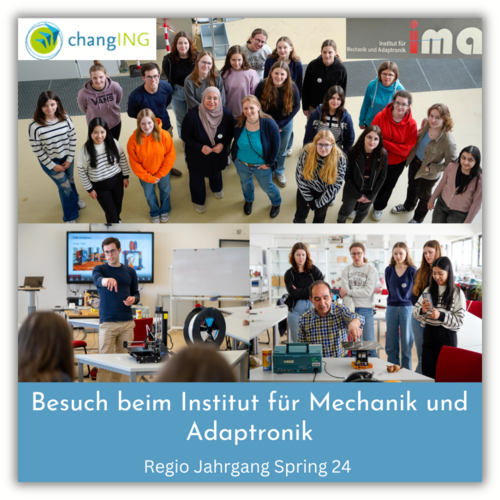
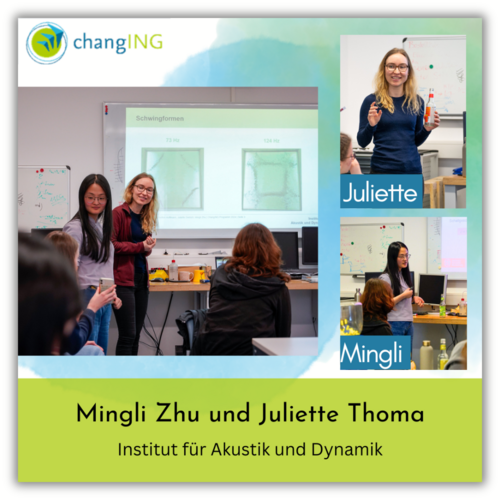
We would like to introduce you to our research assistants!
We start with Mingli Zhu and Juliette Thoma. Both studied mechanical engineering and now work as research assistants at the Institute of Acoustics and Dynamics. We asked them a few questions, which they answered.
Mingli: What fascinates me most about my work is the opportunity to find solutions to real problems and thus have a positive impact on other people's lives. My interest in acoustics was sparked at a young age when my mother often couldn't sleep because of street noise. I longed to find a way to reduce the noise for her, and this feeling planted the seed for my later interest in acoustics. When I then got the opportunity to do an internship in this field. The experience strengthened my interest in acoustics. So I decided to continue my path in acoustics.
Juliette: My work focuses on the early integration of acoustics into preliminary aircraft design. I find it particularly exciting that vibroacoustics accompany us throughout our lives, but we only perceive them when they have a particularly disruptive or positive effect. My interest in acoustics was awakened during my mechanical engineering studies by the lecture on vibroacoustics. As a result, I worked as an assistant scientist at DLR Braunschweig in this field alongside my studies and dealt with the topic of cabin noise in depth in my Master's thesis. Building on this, I was particularly interested in my current job, as it allows me to apply the knowledge I have acquired and the analytical thinking patterns I have learned in a targeted manner.
Mingli: If I had to highlight a special moment, it would be my experience during my Master's thesis. The topic was reconstructing the sound of a flute using acoustic simulations. During this time, I overcame numerous challenges and gained valuable insights. It was particularly challenging to build complex mathematical models to accurately simulate the sound of a flute. This required a deep understanding of acoustics and signal processing as well as the ability to use various software tools effectively. This experience has shown me that some difficulties are only seemingly daunting, but can be overcome.
Juliette: There are moments that have shown me how far I have come and that problems that were complicated and challenging for me at the beginning are much easier to solve thanks to the knowledge and experience I have gained. The knowledge that I am growing with difficult tasks allows me to approach new tasks with a certain composure.
Mingli: One of my biggest challenges during my master's thesis was to create a continuous model directly from a 3D scanned model using free software programs. Normally, 3D scans only generate discrete coordinate points that represent the shape of the original object, but do not provide a continuous structure. It was particularly difficult as I could not find any directly corresponding instructions online. Later, I combined the content of over a dozen indirectly related video tutorials and used four different software programs to create a continuous model. This required a lot of perseverance and creative problem solving, but in the end I did it.
Juliette: Studying mechanical engineering is not always easy and sometimes requires a lot of perseverance, which is particularly noticeable in the modules that you don't particularly like thematically. At such times, you should not lose sight of the personal goals you are pursuing with your studies and draw the motivation to successfully complete these modules as well. Every piece of knowledge you learn will help you to overcome future problems, sometimes by several means. Later on in your studies, you are free to deepen your knowledge in your areas of interest and you should never forget that at the beginning of your studies!
Mingli: I think it is extremely important to believe in yourself. Self-confidence plays a crucial role as it fosters the motivation and perseverance needed to solve complex problems and learn new concepts. Students can boost their confidence by taking on challenging tasks and seeking support from teachers and mentors. It is also helpful to celebrate successes and learn from mistakes rather than seeing them as failures. Finally, it is also important to maintain a positive attitude and reflect regularly to recognize and encourage personal growth and progress.
Juliette: A healthy self-confidence is very helpful to avoid being overwhelmed by difficult and challenging tasks. You should be aware that self-confidence is something you build up bit by bit through experience and small successes over the course of your studies and, of course, not a quality you bring with you from the outset. Mastering tasks and finding a direction in which you feel comfortable and which you enjoy helps enormously to build self-confidence!
Mingli: In this profession, it is particularly important to have analytical and problem-solving skills. You need to be able to analyze complex data, recognize patterns and derive coherent instructions for action. Technical understanding is also essential in order to be able to work efficiently with specific tools and software. Flexibility and the willingness to constantly learn and adapt to new challenges are also crucial factors.
Juliette: As many different facets have to be taken into account when working on complex technical problems, a structured and independent way of working, for which you are prepared through many projects and assignments during your studies, is very helpful. Creativity also helps you to constantly discover new perspectives and develop new solutions. Every problem is like a puzzle that needs to be solved!
Mingli: I would give students the following advice:
Juliette: First of all, take heart! There are so many interesting and exciting careers you can pursue with a STEM degree, and the many intersections in the fundamentals mean you have a lifetime of opportunities to develop personally and professionally. Even if you are not one hundred percent sure at the beginning whether your chosen course of study is the right one, for example, you can take a wide variety of paths and find your niche with the basics you have learned! For this reason, you should approach your studies with an open mind and see where your journey takes you, as doors often open that you hadn't expected.
May
Our regio year group's time together in Braunschweig started with a sound walk through the city. Various measurements were taken and evaluated using the phyphox app. Amina Fock, who led the walk, was also able to tell the students something about her mechanical engineering studies. At the end of the walk, they had a map showing which streets were the loudest.
The second day started with the evaluation of the walk at the Institute of Acoustics and Dynamics. Juliette Thoma and Mingli Zhu also repeated the most important terms in acoustics. The students were then divided into three groups, which went through three stations one after the other.
The stations took a closer look at guitar strings, loudspeakers and chladnic sound figures, among other things.
Finally, the song “All my little ducks” was blown onto bottles. They were first filled with water and measured with phyphox, then each one was given a tone and they were able to play the song.
Many thanks again to Juliette Dietrich, Mingli Zhu and their colleagues from the institute for the exciting insights and the great experiments!
#sciene #research #tubraunschweig #se2a #se2a_changing #tb
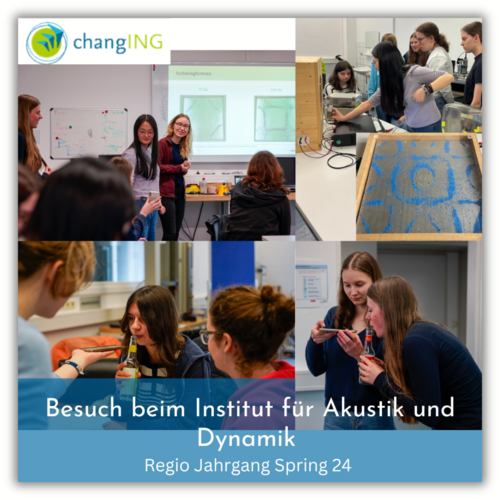
April
Last Tuesday, our regio class attended an event on the optimisation of transport routes and logistics systems.
Dominik Wittenberg, who led the event, first gave an overview of the Institute for Intermodal Transport and Logistics Systems and insights into the Automotive Research Centre Niedersachsen (NFF).
This brief overview was followed by a discussion of mobility and how this is simulated on the computer. Several Raspberry pi's, i.e. single-board computers, are used to find optimised routes. This method is also used in aviation and is explained for us in a simplified way using the example of school routes.
Many thanks to Dominik Wittenberg for the exciting insights. We are already looking forward to our visit in mid-April, where we have planned a challenge with our Cutebots.
#science #research #tubraunschweig #se2a#se2a_changing
March
Our regio year 24 had another event, this time on the subject of acoustics.
In the run-up to the event, our students carried out various experiments at home. For example, they excited a wine glass filled with water and measured the frequency using the phyphox app.
After a brief introduction to the content, the two members of staff from the Institute of Acoustics and Dynamics then referred back to the observations and analysed them together.
Many thanks to Mingli Zhu and Juliette Thoma for the very informative event! We look forward to seeing you at the institute.
#se2a #se2a_changing #tubraunschweig #science#research
When was the first flight? What is lift? What's in a cockpit?
The girls from the changING regio research club asked themselves these and many other exciting questions.
Research assistant Andrés Arango from the Institute of Flight Guidance answered these and other questions during the interactive event.
We are already looking forward to the flight simulator in April and would like to take this opportunity to thank Andrés Arango once again for the successful event.
#science #research #se2a #se2a_changing#tubraunschweig
Our Year 23 class visited the Institute of Fluid Mechanics twice.
Firstly, there was a theoretical introduction to the subject. Various types of flow and effects such as wake vortices and stalls were explained. Many interesting questions were also answered, such as how an aeroplane flies or what fluid mechanics is used for in everyday life.
Our students were then allowed to experiment in a wind tunnel together with Florian Siebert. They were able to test how separation occurs on a wing profile or what a turbulent flow sounds like. They also measured the lift of a wing profile depending on the angle to the flow.
Many thanks to Florian Siebert for the theory combined with practice!
#science #research #tubraunschweig #se2a#se2a_changing
How does an aeroplane actually fly? This is what the participants of the changING regio research club focussed on.
Florian Siebert, a research associate at the Institute of Fluid Mechanics, guided the participants through the event, which was once again held online.
The apparent magic of flight was complemented by many everyday examples. For example, the banana flank in football and the dimples of golf balls were discussed.
Many thanks to Florian Siebert for the interesting insights into fluid mechanics! We are already looking forward to visiting the institute in April.
#science #research #tubraunschweig #se2a#se2a_changing

February
Our participants in the changING regio research club had another event, this time on the topic of developing and optimising components.
Jan Kube, a research associate at the Institute of Mechanics and Adaptronics, led us through the event, which was once again held online. He also revealed the secret of what was inside the small boxes that were sent in the hands-on boxes. These were 3D printed structures. The students also learnt about 3D printing, what is needed for it and how to send it to the printer so that the model can be printed.
Many thanks to Jan Kube for the interesting insights into 3D printing! We are already looking forward to visiting the institute in April.
#tubraunschweig #science #research #se2a#se2a_changing

ChangING regio starts with the first content-related event: What actually is lightweight construction? The answer to this question was answered by the Institute of Aircraft Design and Lightweight Structures together with the students of changING regio.
At the beginning, the Cutebot and its programming were briefly discussed again. The students helped each other to solve problems. They will continue to test the various functions over the coming weeks.
Mats Overbeck and Jorge Bustamante then guided the students through the event. They spent a lot of time in groups discussing what exactly lightweight construction involves and what it is used for. In between, there were estimation questions about various aircraft parts made from different materials.
Many thanks to Mats and Jorge for this interactive event! See you on site in April!
#science #research #tubraunschweig #se2a#se2a_changing

The class of 2022 is starting the project phase!
At the weekend, they took part in an idea-finding workshop. They collected lots of great ideas and decided on an area of interest to them. This is also how they got together in their groups.
By Sunday, they had an almost finalised project plan that they will be pursuing over the coming months.
The projects are again within the framework of the ‘smart city’ theme and can be realised on the premises of the makerAcademy and with the support of the institutes of the SE2A Cluster of Excellence.
We are already looking forward to the finished projects! Many thanks to Amina and Tessa for co-leading the workshop.
#science #research #tubraunschweig #se2a#se2a_changing

After the successful CAD workshop, our class of 2023 was back at the Institute of Mechanics and Adaptronics.
Research assistant Jan Kube gave our students a tour of the institute. For example, they visited the 3D printing laboratory and the workshop.
Afterwards, 3D printers of various types and sizes were shown and examples of their printing results were presented. The respective properties were also explained.
Finally, they were taken to a hall with large experiments. There they could see robot arms, innovative car bodies, aeroplane wings and much more.
Many thanks to Jan Kube for these impressive insights into 3D printing!
#science #research #tubraunschweig #se2a #se2a_changing
January
Our Year 22 students will soon be starting the project phase, where they will be realising their own ideas and projects. In preparation, they took part in an electronics and programming workshop. They were accompanied by Sören from the makerAcademy.
To begin with, they were given a brief introduction to programming Arduinos. They were then slowly introduced to the tasks ahead.
They were each given an Arduino kit with a circuit board, a controller, a display and various sensors, which they then assembled according to the instructions.
To ensure that the display can also show the data collected by the sensors, the students developed and installed a programme on the laptop in group work.
Thanks to the basics of the Arduino and some exemplary components, they can more easily develop new sensors and are well prepared for the projects. We are already looking forward to the ideas in the project phase!
#se2a #se2a_changing #tubraunschweig #science #research


November
On Tuesday 7 November 2023, our 5th kick-off event for a new year took place.
Prof. Dr.-Ing. Jens Friedrichs, spokesperson for the Cluster of Excellence, as well as Dr Anne Geese and Dr Dina Al-Kharabsheh, the organisers, warmly welcomed our 2023 cohort.
After a brief organisational introduction, the students were able to get together in their groups and get to know each other better. A few warm-up games were played and information about the upcoming dates was discussed.
The groups then got together in teams for the spaghetti marshmallow challenge, which resulted in some very nice towers. The tallest tower was even 72 cm high and was able to carry the marshmallow as the top.
In total, there are almost 30 new faces in the research club and we are looking forward to spending time with you!
#science #se2a #se2a_changing #tubraunschweig #research

Following the successful rocket building workshop in June, the rockets that had been built were finally launched.
Firstly, a brief introduction was given to which engines (propellant kits) would be used. This was followed by a safety briefing and then it was time to get started.
Everyone was allowed to go to the launch pad individually with a supervisor, prepare the igniter and press the button to launch.
The rockets with the small motors flew about 70 metres high and those with the slightly larger motors flew up to 200 metres.
All in all, it was a very exciting event!
#science #research #tubraunschweig #se2a #se2a_changing

Another year of changING has begun!
At our kick-off event, our year groups met and had the opportunity to talk to the others. After a bit of organisational information on how to proceed, a challenge followed. They got together in groups and thought about how to make a film can fly as far as possible. They had vinegar and baking powder at their disposal.
We look forward to the next events with you!
#science #research #tubraunschweig #se2a #se2a_changing

August
We had our final event just before the summer holidays. Dr André Bauknecht warmly welcomed everyone at the beginning and then Dr Anne Geese gave a short review of the year.
The 2020 and 2021 cohorts then presented the projects they had implemented and were able to exchange ideas with the other cohorts. The participants from the 2019 cohort also brought along their projects again and reported on their experiences.
This year was the first time we said goodbye to a graduating class. We would like to wish our 2019 cohort all the best for the future.
Thank you for your successful projects and the insightful discussions!
#science #research #tubraunschweig #se2a #se2a_changing

June
All changING year groups had the opportunity to take part in a workshop on building a rocket. Beforehand, there was a brief insight into the Experimental Space Interest Group (ERIG) and a theoretical introduction to rocket design. Afterwards, our students were able to get active themselves and build their own rocket. Finally, these were decorated. They will be launched in September!
Thanks to the team and our mentor Anja, who is active in ERIG herself and helped organise the workshop.
#science #research #se2a #se2a_changing #tubraunschweig

Our 2022 students had the opportunity to talk to real experts!
At the Institute of Fluid Mechanics, they were able to talk to André Bauknecht and Christian Breitenstein in a relaxed atmosphere. It wasn't just about aerodynamic issues, such as what winglets are useful for or whether a train can be derailed by attacking winds, but also generally what opportunities there are after leaving school. Which degree programmes are on offer, whether a stay abroad is advisable or whether you can do an apprenticeship first.
All questions were addressed and answered in detail. Thanks to our experts!
#research #science #tubraunschweig #se2a#se2a_changing

After a short introductory theory session, the 2022 students were able to try out the wind tunnel. ‘What influence does the angle of attack have on lift?’ and “How does the flow behave?” were some of the questions they were able to answer. Even the difference between laminar and turbulent flow could be recognised and heard on attached threads.
All in all, a lot was tried out. Thanks to Christian Breitenstein for the insights!
#science #research #tubraunschweig #se2a#se2a_changing

May
Our class of 2022 was on the road again. This time, they visited the Materials Testing Institute (MPA) and the Institute of Building Materials, Concrete Construction and Fire Safety. They were able to take a look at various types of concrete 3D printing. It's not just about printing special designs, but the aspect of sustainability also plays a major role in 3D printing with concrete. Finally, the students' names were printed in concrete.
Many thanks to the scientific staff who accompanied the students.
#science #research #tubraunschweig #se2a #se2a_changing

April
At the Future Day at the Technical University of Braunschweig, around 50 students came to the SE2A Cluster of Excellence. We were also there to introduce changING and welcome the students. They were able to visit the various institutes of the cluster and experience science. One highlight was the flight simulator.
We are delighted that so many students were there!
#se2a #se2a_changing #tubraunschweig #science #research

March
The students of the class of 2019 presented their projects, which they developed themselves under the supervision of various research assistants in the institutes. They were able to complete them shortly before the final exams.
One group built a drone themselves, while another developed a stair-climbing vacuum robot.
Another group carried out experiments on various wing profiles. There was also an overview with software about future air traffic from another group. The Jugend forscht project on the economic feasibility of high-altitude pseudo-satellites (HAPS) in use for nationwide mobile phone coverage was also developed in this project work.
Thanks to all the scientific staff involved and good luck to our students in their A-level exams!
#science #research #tubraunschweig #se2a#se2a_changing

Following the visit to the Institute of Mechanics and Adaptronics, our class of 2022 visited the MakerAcademy. They were given the opportunity to familiarise themselves with a CAD programme and were able to design an object themselves in TinkerCAD. This can be printed in the 3D printer.
Many thanks to Hendrik and Sören for their support!
#science #research #se2a #se2a_changing #tubraunschweig

Our class of 2022 visited the Institute of Mechanics and Adaptronics last week. After a brief introduction to the institute, our students were given a short introduction to 3D printing. The various areas of application and the programmes required for this were explained. They were then able to print something themselves. As an example, a research assistant designed and printed a small Fusion 360 rocket. They were able to take the rocket with them as a souvenir.
Many thanks to Hendrik Traub for the interesting insights!
In the next events, our students will delve deeper into 3D printing and the programmes. The TinkerCAD programme is on the agenda, as well as creating their own models with it.
#se2a #se2a_changing #tubraunschweig #science #research

February
Our class of 2022 visited the Institute of Acoustics. After a brief introduction to what acoustics means, the students were able to carry out three exciting experiments.
The first involved a sound camera that recognises where the sound is coming from and displays it on the image. They also tested the point at which it can no longer recognise the sound.
This was followed by a disc with beads on it. Different frequencies were set and many different patterns were created on the plate. The pupils tried to find out which and how many patterns could be shown.
The third experiment involved visualising sound by moving a membrane. A loudspeaker was observed.
All three experiments involved a lot of testing and trial and error in order to gain an understanding of sound.
The Institute of Acoustics works in the Cluster of Excellence #se2a and researches the sustainable development of air transport.
Many thanks to Dr Tobias Ring for the great experiments!
#se2a #se2a_changing #tubraunschweig #science#research

Our 2020 and 2021 classes got creative at the weekend. On Saturday, they formulated ideas on what else could be needed for a SmartCity, got together in a group and worked out an idea together that is to be implemented.
On Sunday, the group continued to work on planning the project and discussed the next steps. They are now ready to start realising their projects and arrange appointments at the makerAcademy. An exciting time begins for the students.
We look forward to the presentation of the projects in June.
#se2a #se2a_changing #tubraunschweig #science#research

Our class of 2022 was out and about in perfect weather. At Prinzenpark, they travelled across the city in groups of two or three. They worked on an actionbound and, with the help of the phyphox app, were also able to measure the sound level. The students realised that despite the same calibration, the results can vary greatly, as the volume of traffic was also very different.
Overall, the questions and texts of the Action Bound provided a good overview of the topic of sound, even if the measurements did not always match the expected results. Thanks to the fact that the groups also exchanged information with each other, it was still possible to achieve meaningful results overall. The event ended together in a bakery.
#se2a #se2a_changing #tubraunschweig #science #research

January
How can I set myself a career goal? How can I achieve my goals? What values are important to me? Our students from the 2019, 2020 and 2021 classes asked themselves these and similar questions over the past few weekends. They had the opportunity to recognise their personal values and get to know themselves better during the workshop led by Dr Angelique Eydam.
The 2019 students are currently in their final year of school and are considering their career aspirations. We support them in setting their career goals and show them how they can achieve them.
The 2020 and 2021 cohorts initially looked at the question of whether a career in engineering suits them. In the further course, they will also deal with their career goals.
Many thanks to Angelique! We look forward to the next workshop with you!
#science #research #tubraunschweig #se2a#se2a_changing
December
Our 2021 students were invited to a very special experience. The Institute of Flight Guidance with the two research assistants Andrés Arango and Jonas Füllgraf immersed them in the world of pilots.
The students were able to take over most of the controls of an A320 or the Donier Do 128-6. After a short introduction, they practised a circuit, as well as take-off and landing.
Not every aircraft was able to land successfully. It is quite difficult to keep an overview and use your fine motor skills, but it was still incredibly fun for everyone!
Many thanks to Andrés and Jonas!
#research #science #se2a #se2a_changing #tubraunschweig #flight simulator
Our class of 2022 attended the makerAcademy to get to know each other better as a group. The workshop started with a puzzle to determine the distribution. The actual challenge then began: build a landing module so that the space capsule can land safely on Earth.
The students had to solve puzzles to raise money. The budget raised could be spent on various materials to build the landing module. Finally, the test: which crew made of raw eggs would make it to earth unscathed? Some even survived the fall from a height of 3 metres.
All in all, it was a great two afternoons for our two groups.
#research #se2a #se2a_changing #tubraunschweig #science
Our class of 2022 was allowed to visit the DLR_School_Lab. There were 3 stations on different topics.
One station focussed on the "Rosetta" space probe and its mission to the comet Churyumov-Gerasimenko. It is intended to answer questions about the formation of the solar system and life. While experimenting at this station, the pupils learnt a lot about our solar system and the probe's journey.
The second station was all about the wind tunnel. Through the experiments, the pupils were able to feel the air resistance and explore what influence certain shapes have on it.
At the third station, our pupils became air traffic controllers. They were able to set courses for aeroplanes and the order of landings.
All in all, there were many exciting experiments with interesting results.
#science #research #se2a #se2a_changing #tubraunschweig #dlrschoollab
A few days ago, some interested pupils from all year groups went to the Battery LabFactory, a research centre at TU Braunschweig.
The scientific staff introduced the pupils to the technical topic of battery cell production. They were then given a tour of the Battery LabFactory and shown the various systems for the individual production processes, such as calendering electrodes (compression to the desired thickness or porosity) or moulding cells.
They also gained an insight into the interdisciplinary cooperation at the research centre. Not only classical electrical engineering and chemical engineering are represented here. The scientific staff also showed the students the relevance of other disciplines, such as environmental engineering, whose task is to evaluate products throughout their entire life cycle. Computer science is also a must, as the Battery LabFactory shows how data mining, digitalisation and system integration can optimise production.
Our students loved the meeting!
Many thanks to Gabriela Ventura Silva, Christina von Boeselager, Jana Husmann and Aleksandra Naumann!
#se2a #se2a_changing #research #science #tubraunschweig
November
Last week, the class of 2022 had the opportunity to take part in a campus rally. They were given questions and tasks in an app to help them get to know TU Braunschweig and, above all, the main campus.
The questions were solved in no time and they were able to explore the campus within an hour.
Afterwards, there was a mechanical engineering quiz with further stimulating questions.
The event ended with warm drinks and lively discussions.
#science #research #se2a #se2a_changing #tubraunschweig
The class of 2020 visited the Institute of Environmental and Sustainable Chemistry. They were given a tour of the laboratory and explained how the machines there work. The topic of the event was sustainable fuels and the materials from which they can be produced. These considerations were accompanied by several experiments that demonstrated the effectiveness of the fuels.
Thanks to Thorben and Patrick for these interesting impressions!
#science #research #tubraunschweig #se2a#se2a_changing
Our kick-off event took place on Thursday 10.11.22. After a welcome by Prof. Dr. Jens Friedrichs and a short organisational introduction, the students were able to get together in their groups and get to know each other better.
There are a total of 20 new faces in the research club and we are looking forward to spending time with you!
#science #research #tubraunschweig #se2a#se2a_changing
Do you know what J-stringers and Omega-stringers are?
That's what the students in changING year 21 learnt yesterday evening at the Institute of Aircraft Design and Lightweight Structures. The two research assistants Lennart and Daniel gave our group a tour of the institute. They were able to marvel at the facilities for testing how much weight the wheels of a glider can withstand, how a component behaves under combined loads or the orientation of the wingtip of an approx. 6 metre long wing.
Finally, they were given the opportunity to test the fibre composites "glass fibre" and "carbon fibre" on a tractor.
Many thanks to Daniel and Lennart for these insights!
Question for you: Which sample can withstand the most stress?
#se2a #se2a_changing #tubraunschweig #research #science

October
At the last meeting, Lennart Lobritz and Daniel Hahn gave the changING group from the class of 2021 a taster of lightweight construction. What is lightweight construction? Where is lightweight construction used? What lightweight structures are there?
In an interactive online workshop, the students learnt the technical basics: the truss construction method, the stress-strain diagram, the difference between strength and stiffness... In between, the students were able to put their estimation skills to the test.
Do you know how thin the skins of aeroplane structures can be?
Many thanks to Lennart and Daniel!
#science #tubraunschweig #research #se2a #se2a_changing
September
The participants of the research club took part in another TouchTomorrow stream. This time it was about robotics and artificial intelligence. The two lead moderators once again made the content interactive and exciting. They were accompanied by short clips as explanations and a quiz in the app.
There was also additional takeaway knowledge on the individual topics, i.e. more detailed information to read up on. All in all, it was a great insight. Many thanks to the TouchTomorrow team!
More information here.
#science #research #tubraunschweig #se2a #se2a_changing

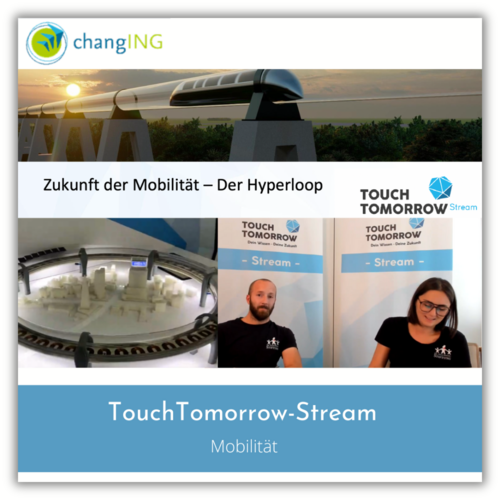
The participants of the research club took part in a TouchTomorrow stream. The two lead moderators made the content on the topic of mobility interactive and exciting. The content was accompanied by short clips as explanations and a quiz in the app.
At the end of the stream, professions and study programmes in the STEM field were addressed. With the help of the MINT-Navi, everyone could search for professions or study programmes that matched their interests and find out more. Here is the link to the Navi.
And which profession or degree programme do you end up with?
There was also information to take away on the individual topics, i.e. more detailed information to read up on. All in all, it was a great insight. Many thanks to the TouchTomorrow team!
More information here.
Or on Instagram: @touchtomorrow_truck
#science #research #tubraunschweig #se2a#se2a_changing #touchtomorrow
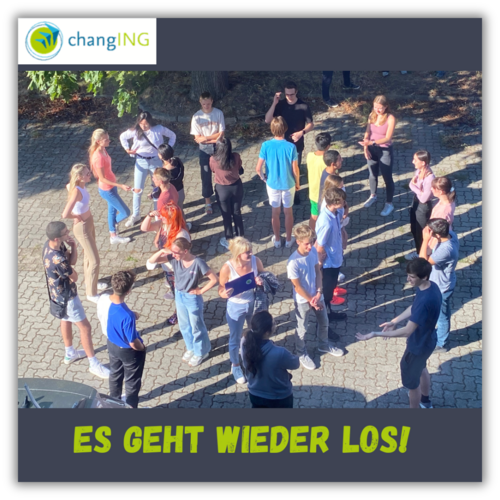
ChangING enters the next round!
There was a lot going on at our kick-off event for the 2019, 2020 and 2021 cohorts. A brief welcome was followed by several warm-up games that encouraged everyone to socialise. The dates for upcoming events were discussed and the marshmallow challenge followed. The participants had to build a tower as high as possible using 20 pieces of spaghetti, one metre of adhesive tape and a marshmallow as the top. And that in just 18 minutes. This resulted in many different approaches and daring constructions.
We look forward to the upcoming events with you and the new class, who will be joining us from November!
#se2a_changing #se2a #tubraunschweig #science#research #marshmallowchallenge
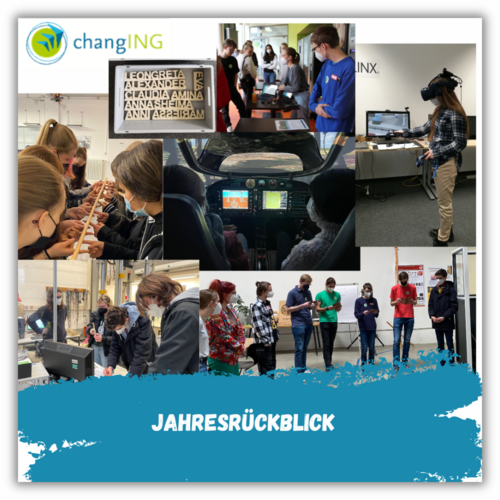
August
What a year!
Many new faces and exciting visits to various institutes at TU Braunschweig characterised the past year. Students were able to work on their own projects and experimentation took centre stage.
Next year can be just as exciting! Are we hoping for more participation?
Would you like to join us? Register for the new year via our website! We look forward to seeing you!
#tubraunschweig #science #se2a #se2a_changing #forschungsclub
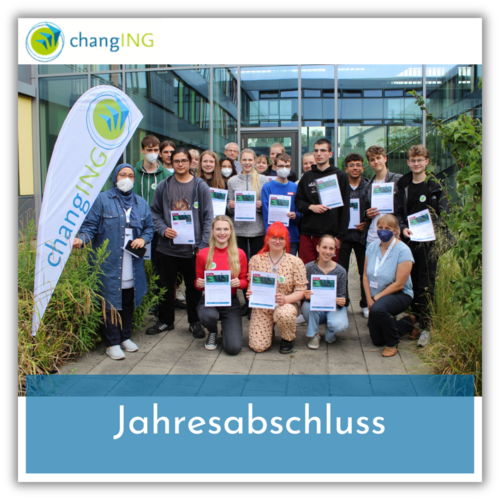
July
Another year of changING comes to an end. At the closing event at the Institute of Fluid Mechanics, the 2019 and 2020 classes were welcomed by Prof Dr Rolf Radespiel and Dr Anne Geese. After a brief review of the year, the participation certificates were presented to the students.
The projects of both years were then exhibited and marvelled at by the other participants. The class of 2021 also joined the project presentation to get inspiration for their projects in the coming year. They were then also welcomed and given a review of the year and an outlook for the coming year. They were also presented with their certificates of participation.
The relaxed afternoon ended with an evaluation of the past events by the students. We look forward to the coming year with more great events and would like to take this opportunity to thank everyone involved once again.
#se2a #se2a_changing #tubraunschweig #research #science #graduation
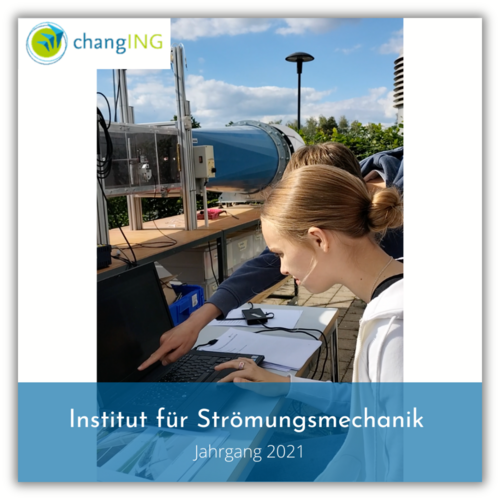
June
Christian Breitenstein, PhD student at TU Braunschweig, accompanied the students through the day at the Institute of Fluid Mechanics. First, the students were given a tour of the hall. This gave them an insight into research with wind tunnels of different types and sizes. Afterwards, they got to do their own research!
At the tabletop wind tunnel, the students took measurements of the lift curve of a wing profile, visualised flows using a profile to which threads were attached and even used a stethoscope to hear the difference between turbulent and laminar flow.
Turbulent flow is the movement of gases or liquids in which turbulence occurs. In laminar flow, on the other hand, the gas or liquid moves in layers that do not mix and have no visible turbulence.
Many thanks to Christian for the interesting day! The students were able to take away a lot of practical and theoretical knowledge!
#research #science #se2a #se2a_changing #tubraunschweig
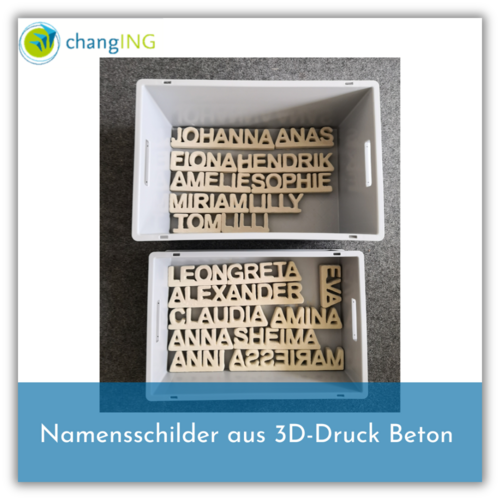
May
Many large concrete components were marvelled at during the Year 21 3D printing workshop. But the precision of the printer also allows for finer structures. The students were able to take their own concrete names home with them!
Many thanks again to Tom-Niklas Rothe for these great name tags!
#science #research #tubraunschweig #se2a #se2a_changing #3ddruck
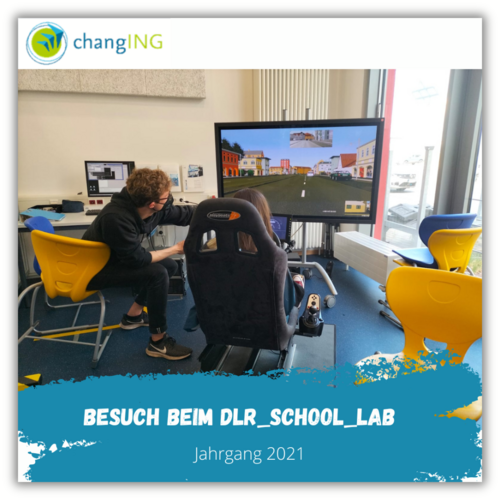
At the beginning of May, the pupils of the 2021 class visited the DLR_School_Lab to research and experience the programme for themselves.
In a driving assistance simulator, the students were able to step on the accelerator themselves and test the programme. Taking on the role of developers, they programmed an emergency braking system for a Lego MINDSTORMS robot. At another station, the participants coordinated and ultimately landed the aeroplanes arriving at Frankfurt Airport as air traffic controllers and pilots. It's amazing how stressful the job of an air traffic controller is!
The ISS station was also impressive. Here, the participants discovered the ISS on a tour of the international space station with the help of VR goggles. It promised to be a realistic experience!
#science #tubraunschweig #se2a #se2a_changing #research #dlrschoollab
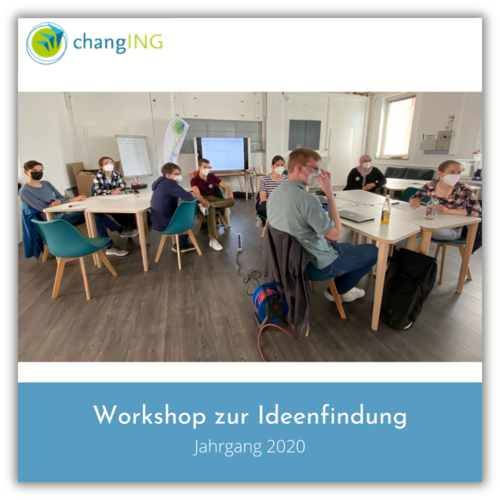
April
The project phase has begun for our class of 2020. They have the opportunity to realise their own ideas in collaboration with the Protohaus. They have a total of approx. 2 months to plan and implement their projects.
The 1st phase of brainstorming has been completed through the two workshops and they can start with the implementation. The photos show the students during the group identification and planning phase.
We are looking forward to the results and are excited to see how the ideas will be realised.
Many thanks to the Protohaus team for actively supporting and guiding us and the students.
#se2a #se2a_changing #science #research #tubraunschweig
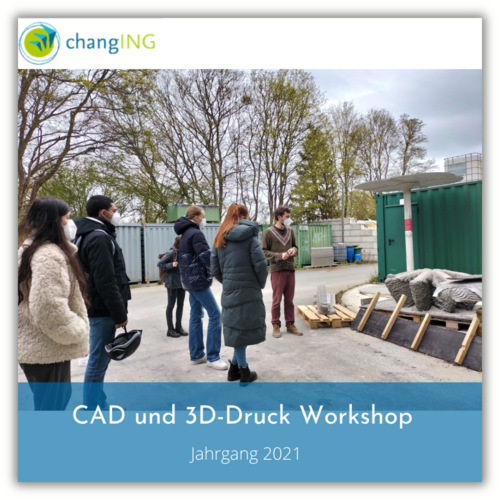
We are offering the CAD and 3D printing workshop for the 3rd time. This time, the class of 2021 was able to take part, with the students visiting the Institute for Building Materials, Concrete Construction and Fire Protection (iBMB) and the Digital Building Fabrication Laboratory (DBFL). A tour of the DBFL was conducted with the students. They were able to gain an insight into the operation of the robot-controlled production system. During the tour, they also saw concrete parts that had already been printed, which gave them an understanding of the difficulties of concrete printing and the focus of the research.
In addition to this highlight, the students were able to experience the 3D printing technology of particle bed printing live at the iBMB. Thanks to the precision of the process, it is even possible to print personalised name badges to take home!
Many thanks to the research assistants Friedrich Herding (iBMB) and Stefan Gantner (DBFL)!
During the workshop, they also had the opportunity to design their own virtual model and have it printed with the 3D printer. Here are two examples of the students' creativity. The models could be picked up after printing and taken home. There were no limits to their creativity.
Many thanks to Hendrik Traub, Zhuzhell Montana and Tom-Niklas Rothe for their support and for leading the workshop!
#se2a #se2a_changing #tubraunschweig #science #research #3ddruck
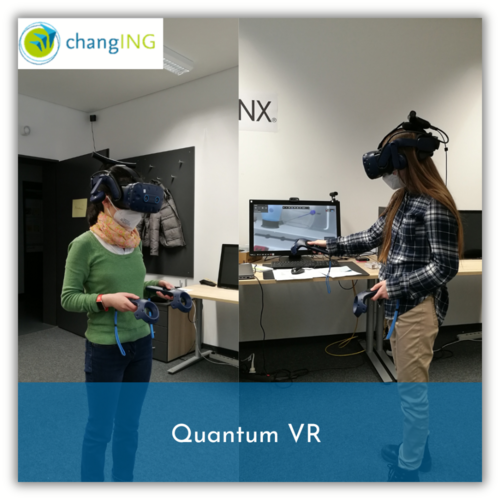
Several pupils from the research club from all year groups had a unique opportunity. They were able to take part in a trial of a VR escape game for quantum programming.
In QuantumVR, they successfully created quantum algorithms and freed Mr X the cat and his gang from the lab. Even if the game prototype still presented one or two difficulties, the subsequent survey clearly showed that everyone had fun!
Many thanks to Franziska Greinert for the great opportunity!
#se2a #se2a_changing #research #science#tubraunschweig #quantumvr
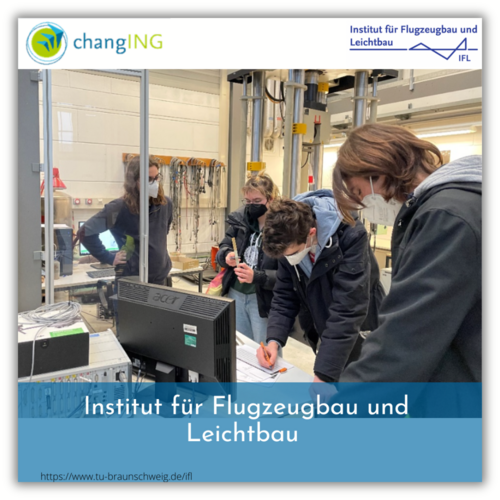
March
Research assistants Lennart Lobnitz and Daniel Hahn from the Institute of Aircraft Design and Lightweight Construction introduced the students to lightweight construction. In an online presentation, the two explained what lightweight construction actually is and presented various materials and material tests.
During the subsequent tour of the institute, the students were guided through the institute's test hall. During the tour, they learnt about various experiments that are carried out at the institute.
The students were also allowed to carry out a tensile test themselves. They were able to clamp various materials in the testing machine and it was explained how they can determine the modulus of elasticity and tensile strength of the materials through the test.
Thank you Lennart and Daniel for the great insights and see you next time!
#se2a #se2a_changing #tubraunschweig #lightweight #research #science
February
In cooperation with the Institute of Dynamics and Oscillations, the topic of uncertainty, probability simulation and Monte Carlo simulation was explained in several online sessions. The students applied the theory they had learned by analysing an unfair cube and various uncertainties using an example from aviation.
Using the Jupyter Notebook (a programme based on Python), the students programmed a Monte Carlo simulation. With the help of Jun.-Prof. Dr.-Ing. Ulrich Römer, they determined the range of an aircraft and analysed the unfair cube. They not only internalised the theory, but also learnt some basics of the programming language Python.
#tubraunschweig #science #se2a #se2a_changing#programming #phyton #mechanical engineering #aviation #probability theory #jupyternotebook
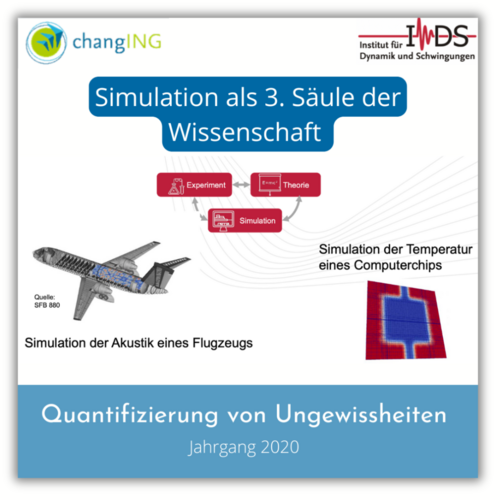
Cluster of Excellence SE²A –
Sustainable and Energy-Efficient Aviation
Technische Universität Braunschweig
Hermann-Blenk-Str. 42
38108 Braunschweig
se2a(at)tu-braunschweig.de
+49 531 391 66661
